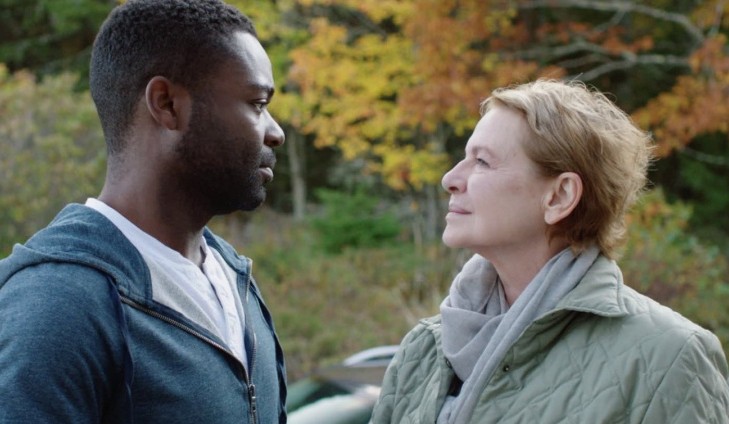A young couple, Sherwin (David Oyelowo, “Selma,” “Nightingale”) and Fiona (Hani Furstenberg “The Loneliest Planet”) are playing away a sunny Sunday morning in crisp white sheets, teasing and chatting in the film “Five Nights in Maine.” They are bright, happy people, but something loose floats in the air, a crack in the tousling joy. We see they’re married, but probably only months, maybe a year. There are other scenes, dancing at a party, walking.
We see Sherwin coming home to an empty house, fiddling with the fridge, opening the mail, listening to his love’s voice on the recorder. Later that night the phone rings. When a phone rings after dark in any movie, it’s never a good thing, and it isn’t here.
Sherwin’s beloved Fiona is killed in an auto accident. We watch it hit and see it rattling around in Sherwin’s head and flowing out of his tear-filled eyes.
Then there is the fall — in Sherwin’s case, a slow descent, like a large wounded bird tumbling toward a dark river, and trying to get its wings to work before the crash.
Sherwin struggles and fails, hits the bottom. He sleeps around the clock, starts drinking, stops shaving, stops eating and sleeps some more.
His sister (Teyonah Parris) steps in with groceries, brings her son to the house with video games. Sherwin isn’t responding but then is rescued by a call from Maine. It’s his mother-in-law, Lucinda (Diane Wiest), who we learn is a recluse, a woman of some wealth, dying of cancer.
Sherwin, perhaps in sympathy or just to escape from his own drowning, drives up to Maine to spend a few days. We know it’s not going to be pretty from here on out, and the feeling is confirmed when we meet Lucinda, not only dying in the flesh but in spirit.
In a few scenes, we learn that she and Fiona were hostile and spent a lifetime damaging each other. But that’s the past. The present involves a black son in-law roaming the house, the fields, sea-watching on the rocky beach.
Sherwin makes her an egg salad sandwich, a few cups of tea. She treats him with cool indifference, as though he’s a visiting physical therapist. They dine together in a chilly dining room, two place mats, two services, an aging, dying white woman and a black widower.
Some things are spoken that suggest that her daughter’s marriage to a black man was the final snap in the fragile twig of hope that held mother and daughter together.
Some sort of fear hangs about the small village like a damp fog. Certainly not a brewing storm, but there are a few disquieting moments: chilly looks from locals in the village shops, rifle shots in the woods where Sherwin is walking that cause him to run in fear. He falls and hurts his leg.
It seems for the moment that writer-director Maris Curran feels a film about the grieving of a man we don’t really know enough about, and the dying of a bitter old woman we don’t really like, is too thin a soup. Will the pepper of racism pop up and add some thickening? Maris is too smart a writer to try that. Each actor here, all pros, gives it his or her best.
A tiny spark of hope snaps in with Lucinda’s day nurse (a welcome Rosie Perez), who shadows Sherwin, trying to provide some background about the years of mother-daughter strife. This is a new, fresh Perez, all free of the Latina street girl hipster box Spike Lee locked her into in his “Do The Right Thing.” Here she is older, smoother.
Director Curran is to be praised for her locations, and Sofian El Fani’s camera captures the bleak late fall look of Maine with shots of Brunswick, Phippsburg, Cape Elizabeth and some of South Portland.
Despite good intentions and casting, the movie flutters, struggles and keeps trying to light a fire of hope. We would settle for a spark or two, something one of them can blow into a small flame to leave us at the end, if not with a big hug, at least an unspoken promise of reconciliation.
But these are damaged people in a cold climate, and winter is coming. We can only hope.
J.P. Devine, a Waterville writer, is a former stage and screen actor.
Send questions/comments to the editors.




Comments are no longer available on this story